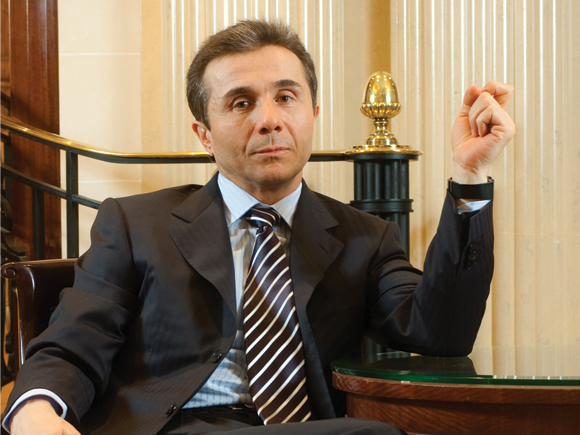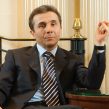
Ivanishvili and Georgia: From Personal Paternalism to State Paternalism?
Publication: Eurasia Daily Monitor Volume: 8 Issue: 189
By:

The tycoon Bidzina Ivanishvili, worth $5.5 billion on the latest Forbes List, has announced his intention to become Georgia’s political leader. A reclusive figure throughout his life thus far, Ivanishvili earned his fortune in Russia since the 1990’s under a veil of obscurity. He systematically avoided Russian and Georgian media during all these years, and showed no interest in politics. But he has suddenly moved into the limelight this past week, announcing his entry into Georgia’s politics in opposition to the government.
Ivanishvili proposes to form a unified opposition movement out of multiple small groups, concentrating them under his leadership. He displays full confidence in winning the May 2012 parliamentary elections, and looks ahead undoubtedly to the 2013 presidential elections.
By far the richest man in Georgia, his financial resources almost on a par with the state’s resources (see “Georgia Tycoon Ivanishvili Ready To Bid For State Purchase,” EDM, October 14), Ivanishvili presents his views in two silence-breaking documents released on October 7 and 12, respectively (Georgian press monitored by the BBC, Former Soviet Union Political File Georgia, October 8-13; Kavkas-Press, October 7, 13; Interfax, October 7, 12). The two documents are written in the form of open letters, discursive and narrative in style, and with overlapping content. Unlike the militant opposition leaders, Ivanishvili does not use mob-rousing rhetoric. Instead, he flaunts his wealth and business acumen.
The salient ideas in his documents are:
1. Grievances. Ivanishvili accuses the president of having fraudulently won the 2008 election, and running a Brezhnev-type government; and he accuses the government of mismanaging economic policies. He would end this “monopoly on power” and “elite corruption” (no specifics). “As soon as he saw that “the motherland was being lost, [Ivanishvili] decided to enter politics.” These charges contradict the Western observers’ assessment of the 2008 election as correct (Saakashvili won on the first round with 53 percent, compared with the runner-up’s 22 percent). It seems to ignore the government’s anything-but “stagnant” policies (the most common observation is actually the record-fast pace of reforms); and it fails to acknowledge Georgia’s surge in the international economic, business, and anti-corruption rankings.
2. Domestic Political Goals. These focus on winning a parliamentary majority in May 2012, changing the government, and ensuring that President Mikheil Saakashvili does not serve as prime minister after the 2013 expiry of his presidential term. “I have promised the Georgian people that I will come to power. I will certainly do so.” Beyond this, Ivanishvili promises, “I will ensure the prosperity and the well being of every Georgian citizen.”
3. Strategy and Tactics. Ivanishvili will soon form a new political party, hold its founding congress, and unite the “healthy opposition forces with our party.” He aims to win an absolute majority in the May 2012 parliamentary elections, and change the constitution – apparently, from presidential to fully-fledged parliamentary republic. Ivanishvili would “personally coordinate” all these processes. He would then take over, either as Prime Minister or Chairman of Parliament (the most powerful posts in a parliamentary republic), but only to serve “two or three years” and then resign.
4. Political allies. Of the myriad groups in the opposition, Ivanishvili singles out as preferred allies: the Republicans, the Free Democrats (two seats and one seat in parliament, respectively), and former ombudsman Sozar Subari (he had formed his own extra parliamentary party while serving as ombudsman, oblivious to the incompatibility). Of these, Free Democrat leader Irakli Alasania has already announced a preliminary deal with Ivanishvili (Kavkas-Press, October 12). Clearly, Ivanishvili’s doors are open to other groups also. But he rejects, by name, another half-dozen groups from the militant opposition, accusing these of faking their opposition “in cahoots with the government.” He also rejects cooperating with Giorgi Targamadze’s Christian-Democrats, the main parliamentary opposition party, which has set an unusual Georgian example of rational negotiations with the government.
5. Mass media. Ivanishvili declares his readiness to buy any television channel for three times its market value, as part of the opposition’s electoral campaign under his leadership. He would then hand the TV channel back to the original owner for just one dollar, after two years (presumably, after the 2013 presidential election). Meanwhile, however, Ivanishvili would create a “public information center” of television and radio channels, newspapers, and websites. He would himself provide financial assistance to such media; would employ journalists who resign, “in protest” or “on principle,” from other media; and he would of course guarantee the editorial independence of journalists who would join his campaign.




